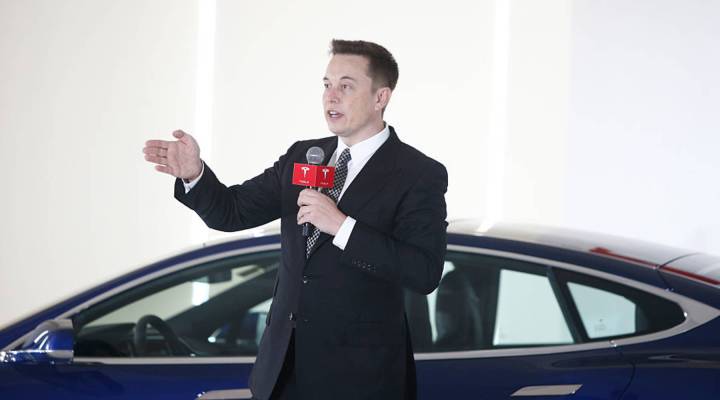
The SEC is trying to drop a hammer on Elon Musk. How big can it be?
Share Now on:
The SEC is trying to drop a hammer on Elon Musk. How big can it be?

In premarket trading Friday morning, Tesla stock dropped about 13 percent after the Securities and Exchange Commission sued Elon Musk for the mess last month when he tweeted that he had “funding assured” to take his electric car company off the public stock market. The SEC says this caused the stock to gyrate, which hurt investors. Musk responded Thursday that the suit against him is “unjustified” and that he always acts in the best interests of shareholders.
Marketplace Morning Report’s David Brancaccio spoke with Peter Henning, a law professor at Wayne State University and former SEC senior attorney, about what could come next. Below is an edited transcript of their conversation.
David Brancaccio: Well, this was fast, less than two months from trigger to lawsuit. What does the pace of this say to you? Anything?
Peter Henning: This is a very high profile case for the SEC. They even said at their press conference that they really wanted to strike while the iron was hot. And typically, an SEC investigation takes months, if not a couple of years, but I don’t think they wanted to let this fade from the public’s mind. So they’re really sending a message here, that “we are ready to go.”
Brancaccio: Some other legal experts were quoted back in August saying that if regulators ever did anything about this matter, it would just be a slap on the wrist. But this lawsuit raises a kind of, I don’t know, nuclear option for a founder-dominated company like Tesla. What is this — possibly banning him from serving as an officer or board member on a public company?
Henning: That’s probably the biggest hammer the SEC has. They’ve asked for a penalty, but that’s likely to be a couple hundred thousand dollars at most, which would be, for a billionaire like Elon Musk, not much. But it’s the director and officer bar that’s the key here. And what the SEC is trying to do is to send a message not only to Musk but to other executives that if you step over this line, we’re going to try to take away, essentially, your ability to lead a company. And you look down the line, too, remember, Musk also controls SpaceX. And there had been talk about SpaceX possibly going public. If there’s a director or an officer ban, it’s not just Tesla, it’s any publicly traded company.
Brancaccio: Now by focusing on Musk, the SEC might be thinking that puts Musk as an individual in the frying pan but somehow protects Tesla shareholders. But if Musk gets driven out by this, that might not help shareholders. There is an irony here.
Henning: Oh, certainly not. And there’s an interesting split with this company, that it has very devoted shareholders but also one of the largest short interests — in other words, people betting against the company — of any publicly traded firm out there. So the divide over Tesla: The devotees are going to say this is the worst thing ever, the short sellers are going to say, “Finally! Someone’s taking him to task and trying to hold his feet to the fire.” So is it going to hurt shareholders? If he gets knocked out of the company — he has been the face of the company. So that’s certainly not going to help shareholders. The question then becomes: Can Tesla’s board come up with a way forward without Elon Musk?
There’s a lot happening in the world. Through it all, Marketplace is here for you.
You rely on Marketplace to break down the world’s events and tell you how it affects you in a fact-based, approachable way. We rely on your financial support to keep making that possible.
Your donation today powers the independent journalism that you rely on. For just $5/month, you can help sustain Marketplace so we can keep reporting on the things that matter to you.












